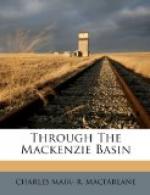Where the channels are shallow, poles are used, which the men handled very dexterously, nicking in and out amongst the rocks and rapids in the neatest way; but in the main the propulsion was by our paddles, a delight to me, having been bred to canoeing from boyhood. We stopped for luncheon at a lovely “place of trees” overhanging a deep, dark, alluring pool, where we knew there were fish, but had no time to make a cast. So far the banks of the Pelican were of a moderate height, and the adjacent country evidently dry—a good soil, and berries very plentiful. Presently, between banks overhung with long grass, birch and alder, we entered a succession of the sweetest little rapids and riffles imaginable, the brown water dancing amongst the stones and boulders to its own music, and the rich rose-pink, cone-like tops of the water-vervain, now in bloom, dancing with it.
Our camp that night was a delightful one, amongst slender birch and spruce and pine, the ground covered with blueberries, partridge berries, and cranberries in abundance. The berries of the wolf-willow were also red-ripe, alluring, but bitter to the taste. It was really a romantic scene. Ladoucere had made his camp in a small glade opposite our own, the bend of the river being in front of us. The tall pines cast their long reflections on the water, our great fires gleamed athwart them, illuminating the under foliage of the birches with magical light, whilst the half-breeds, grouped around and silhouetted by the fires, formed a unique picture which lingers in the memory. We slept like tops that night beneath the stars, on a soft bed of berry bushes, and never woke until a thin morning rain sprinkling in our faces fetched us to our feet.
A good bacon breakfast and then to our paddles, the river-bends as graceful as ever, but with fewer rapids. At every turn we came upon luxuriant hay meadows, with generally heavy woods opposite them, the river showing the same easy and accessible shore, whilst now and then giant hoof-prints, a broken marge, and miry grass showed where a moose had recently sprawled up the bank. Nothing, indeed, could surpass the rich colour-tone of this delightful stream—an exquisite opaqueness even under the clouds; but, interfused with sunshine, like that rare and translucent brown spread by the pencil of a master.
As we were paddling along, the willows on shore suddenly parted, and an Indian runner appeared on the bank, who hailed us and, handing over a sack of mail with letters and papers for us all, sped off as suddenly as he came.
It was now the last day of August, raw and drizzly, and having paddled about ten miles through a like country, we came in sight of the Pelican Mountains to the west, and, later on, to a fork of the river called Muskeg Creek, above which our stream narrowed to about eighteen feet, but still deep and fringed with the same extensive hay meadows, and covered here and there with pond lilies, a few yellow ones still




